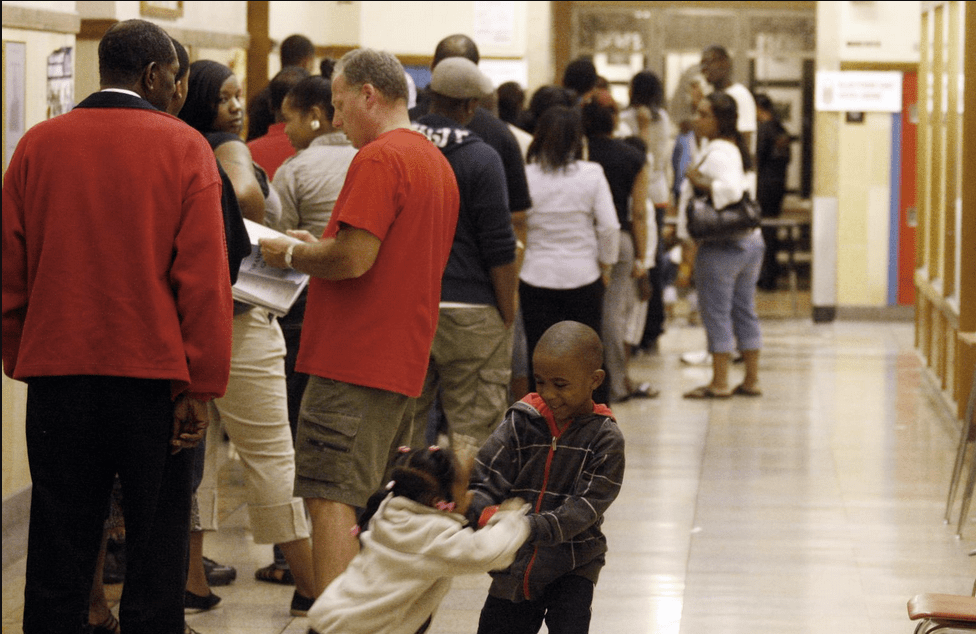
My News21 experience
Photo: Hundreds of thousands of voters took part in the June 5, 2012, Gov. Scott Walker recall election in Wisconsin. Many of them, including these voters at Rufus King High School in north Milwaukee, faced long lines. Photo by AJ Vicens/News21 Related
“Milwaukee Electon Observers earn mixed reviews” by AJ Vicens on “Who Can Vote?”, a News21 project blog
“News21 publishes comprehensive voting rights analysis” on KnightBlog August 13, 2012.
By AJ Vicens
Standing in an elementary school hallway in June in a north Milwaukee neighborhood, the importance of in-person reporting hit home.
“Why do they have to watch us vote?” said Jamila Gatlin, a woman who I was talking to about a group of poll watchers for my News21 story. Gatlin, an African American, was upset that three white poll watchers had each traveled hundreds of miles to sit in her neighborhood-polling place watching for fraud or other possible problems.
My story, about a poll watching training group from Texas that has spread nationwide in just three years, just got its opening scene.
As Jamila Gatlin waited in line at a northside Milwaukee elementary school gym to cast her ballot June 5 in the proposed recall of Wisconsin Gov. Scott Walker, she noticed three people in the back of the room. They were watching, taking notes.
Officially called “election observers,” they were white. Gatlin, and almost everyone in line, was black.
“That’s pretty harassing right there, if you ask me,” Gatlin said in the hall outside the gym. “Why do we have to be watched while we vote?”
In the span of five minutes, Gatlin, a woman who couldn’t have cared less about the story I was working on, put a genuine face on what had mostly been an abstract and wonky story.
I would never have been able to capture her reaction to the poll watchers had I not been there and had editors who know the value of on the ground reporting and research not led News21.
I was also able to travel to Houston, Texas, to meet the subjects of our story in person and spend several days among them. Meeting people in person, after having thoroughly researched and learned about their issues, gives journalists the ability to have substantive conversations with people rather than asking the easy surface-level questions so typical in today’s media landscape.
Having been working in journalism for five years before returning to grad school to refine my skills, I knew well that it’s relatively rare for journalists to have a travel budget these days, let alone student journalists. It’s expensive, and fewer organizations have the resources to send people across the country in pursuit of the story. Add in the relative ease of doing journalism online or on the hyper local level – via Google, Skype and the like – and fewer organizations can justify spending precious dollars on travel and time.
That’s what News21 did for me and the other reporters working this summer out of our Phoenix, Arizona based newsroom. Our editors stressed the importance of research and reporting – with an emphasis on meeting people in person whenever possible. They gave us the time to do stories right, and implored us to think big and ambitious with writing, video, data and interactive graphics.
The News21 experience cemented what seems obvious to most but is increasingly rare in today’s newsrooms. Having the time to research, learn, understand, absorb, report and mold stories after gathering as much information as humanly possible is essential to producing quality depth reporting.
For the rest of my career I will be trying to duplicate the research process afforded to me by News21.
Recent Content
-
Journalismarticle ·
-
Journalismarticle ·
-
Journalismarticle ·


